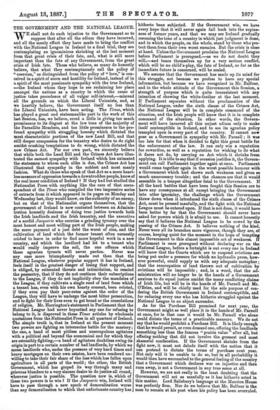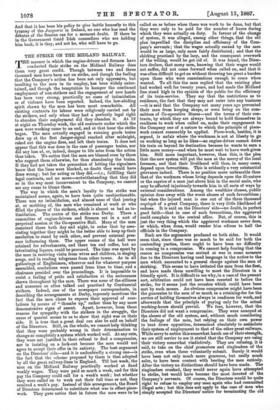THE GOVERNMENT AND THE NATIONAL LEAGUE.
WE shall not do such injustice to the Government as to suppose that after all the odium they have incurred, and all the manly effort they have made to bring the conflict with the National League in Ireland to a final trial, they are contemplating an ignominious shrinking at the last moment from that great crisis of their fate, and, what is still more important than the fate of any Government, from the great crisis of Irish fate. Those who believe, as many do honestly believe, that what they contemptuously call the policy of "coercion,' as distinguished from the policy of "love," is con- ceived in a spirit of scorn and hostility for Ireland, instead of in a spirit of the most passionate sympathy with the true Ireland, —the Ireland whom they hope to see reclaiming her place amongst the nations as a country in which the cause of justice takes precedence of all vulgar self-interest,—misread all the grounds on which the Liberal Unionists, and, as we heartily believe, the Government itself no less than the Liberal Unionists, have been acting. The Times, which has played a great and statesmanlike part in the work of this last Session, has, we believe, erred a little in giving too much prominence to its disgust at the low tone of the majority of the Parnellite Members, and too little prominence to the pro- found sympathy with struggling honesty which dictated the most characteristic portions of the new Land Bill, and that still deeper compassion for the tenantry who desire to do right amidst crushing temptations to do wrong, which dictated the new Crimes Act. For our own part, we sincerely believe that while both the Land Bill and the Crimes Act have illus- trated the earnest sympathy with Ireland which has animated the statesmen to whom each alike is due, the Crimes Act has illustrated that sympathy in the noblest and most manly fashion. What do those who speak of that Act as a mere heart- less measure of oppression towards a downtrodden people, know of the real inner condition of Ireland ? If they had but studied the Nationalist Press with anything like the care of that corre- spondent of the Times who compiled the two impressive series of extracts from it which appeared in its pages on Monday and Wednesday last, they would know, on the authority of no enemy, but on that of the Nationalist organs themselves, that the government of Ireland is now contested between an Adminis- tration honestly desirous of doing true justice towards both the Irish landlords and the Irish tenantry, and the executive of a sordid Jacquerie who exercise a grinding tyranny over the most honest and most willing part of the Irish people, making the mere payment of a just debt the worst of sins, and the cultivation of land which the former tenant often earnestly wished to leave in order to find more hopeful work in a new country, and which the landlord had let to a tenant who would really improve the soil, the one offence which these agrarian tyrants will never pardon. Never was any case more triumphantly made out than that the National League, whatever popular support it has in Ireland, feels itself in the greatest danger of losing that support, and is obliged, by reiterated threats and intimidation, to remind the peasantry, that if they do not continue their subscriptions to the League, if they do not implicitly obey the mandates of the League, if they cultivate a single rood of land from which a tenant has, even with his own hearty consent, been evicted, if they even pay their poor-rates against the order of the League, they will have to undergo the most bitter persecution, and to fight for their lives even to get bread or the consolations of religion. Mr. Harrington's statement in Parliament that the National League had never boycotted any one for refusing to belong to it, is disproved in these Times articles by wholesale quotations from the Nationalist Press in all quarters of Ireland. The simple truth is, that in Ireland at the present moment two powers are fighting an internecine battle for the mastery; the one, a band of most pitiless and unscrupulous agitators with a political end beyond the economical end for which they are ostensibly fighting,—a band of agitators doubtless owing its origin in part to a certain number of bad landlords, by which we mean landlords who, under the pressure of very hard times and heavy mortgages on their own estates, have been rendered un- willing to take their fair share of the loss which has fallen upon agriculture in all parts of the world ; the other, the British Government, which has groped its way through many and grievous blunders to a very sincere desire to do justice all round, wherever justice is possible. The question now is, which of these two powers is to win ? If the Jacquerie win, Ireland will have to pass through a new epoch of demoralisation worse than any demoralisation to which that unfortunate country has hitherto been subjected. If the Government win, we have every hope that it will never again fall back into the supine- ness of former years, and that we may see Ireland gradually resuming the tone of a country in which just judgment is done, and in which the people, on the whole, stand by those who pro- tect them from their own worst enemies. But the crisis is close at hand. Unless the Government proclaim the National League before Parliament is prorogued,—as we do not doubt they will,—and brace themselves up for a very serious conflict, which will be no child's-play, the fate of Ireland, so far as the immediate future is concerned, will be sealed.
We assume that the Government has made up its mind for this struggle, not because we profess to have any special information, but because we have recognised in Mr. Balfour, and in the whole attitude of the Government this Session, a strength of purpose which is quite inconsistent with any intention of showing the white-feather at the last moment. If Parliament separates without the proclamation of the National League, under the sixth clause of the Crimes Act, the National League will be in complete command of the situation, and the Irish people will know that it is in complete command of the situation. In other words, the Govern- ment will have incurred all this unjust odium only to make itself contemptible in Ireland, and to see its agrarian policy trampled upon in every part of the country. It cannot now pose as a Government in sympathy with Mr. Parnell; it was too late for that when it decided to fight this great battle for the enforcement of the law. It can only win a reputation for cowardice, as well as a reputation for wishing to do what it dares not do, by carrying an Act which it shrinks from applying. It is idle to say that if occasion justifies it, the Govern- ment can call Parliament together again at once. Parliament would come together again in the worst possible humour with a Government which had shown such weakness and given so much unnecessary trouble ; and the chances are that it would assemble in a temper altogether fatal to the Government. If all the hard battles that have been fought this Session are to have any consequence at all except bringing the Government into utter ignominy, the challenge which the Government threw down when it introduced the sixth clause of the Crimes Act, must be pressed manfully, and the fight with the National League must be entered upon. If that is outdone, it would have been better by far that the Government should never have asked for powers which it is afraid to use. It cannot honestly say that it believes the National League to be cowed by the passing of the Crimes Act. It believes nothing of the kind. Never were all its branches more vigorous, though they are, of course, keeping quiet for the moment in the hope of tempting the Government to this almost impossible act of weakness. If Parliament is once prorogued without declaring war on the National League, before a fortnight is out every one in Ireland will know that the Courts which are to suspend evictions are being put under a pressure for which no hydraulic press, how- ever powerful, could supply us with any adequate metaphor ; that the reoccupation of land thrown out of cultivation by evictions will be impossible ; and, in a word, that the ad- ministration will no longer be in the hands of a Government anxious to do equal justice amidst the many conflicting claims of Irish life, but will be in the hands of Mr. Parnell and Mr. O'Brien, and will be chiefly used for the sole purpose of ren- dering the British Government in Ireland contemptible, and for reducing every one who has hitherto struggled against the National League to an abject surrender.
As for the Purchase Bill promised for next year, the Government might as well place it in the hands of Mr. Parnell at once, for in that case it would be Mr. Parnell who alone could dictate the terms of a practicable measure. We do not say that he would prohibit a Purchase Bill. It is likely enough that he would permit, or even demand one, offering the landlords something less than the famous "prairie value " after all, but offering nothing that did not involve the grossest and most shameful confiscation. If the Government shrinks from the fight now, it must not delude itself with the notion that it can pretend to dictate the terms of purchase next year. Not only will it be unable to do so, but in all probability it would then have succumbed to the general feeling of the country that a Government which declares war on injustice and then runs away, is not a Government in any true sense at all. However, we are not really in the least doubting that the Government will act as manfully as it has hitherto acted in this matter. Lord Salisbury's language at the Mansion House was perfectly firm. Nor do we believe that Mr. Balfour is the man to remain at his post when his policy has been overruled.
And that it has been his policy to give battle honestly to this tyranny of the Jacquerie in Ireland, no one who has read the debates of the Session can for a moment doubt. If there be in the Government timid Irish counsellors who are holding him back, it is they, and not he, who will have to go.



































 Previous page
Previous page